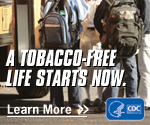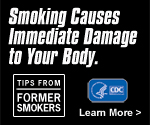Cigars
Overview
- A cigar is defined as a roll of tobacco wrapped in leaf tobacco or in a substance that contains tobacco (as opposed to a cigarette, which is defined as a roll of tobacco wrapped in paper or in a substance that does not contain tobacco).1,2
- The three major types of cigars sold in the United States are large cigars, cigarillos, and little cigars.1,2,3
| Type | Description | Market Share (2009)* |
|---|---|---|
| *Percentage of U.S. market for cigar products4 | ||
| Large cigar | Cigar that typically contains at least one-half ounce of aged, fermented tobacco (i.e., as much as a pack of cigarettes) and usually takes 1–2 hours to smoke. | 49% |
| Cigarillo | A short (3–4 inches) and narrow cigar that typically contains about 3 grams of tobacco and usually does not include a filter. | 31% |
| Little cigar | A small cigar that typically is about the same size as a cigarette and usually includes a filter. | 19% |
- In 2009, cigars generated more than $8 billion in retail sales in the United States.4
Cigars contain the same toxic and carcinogenic compounds found in cigarettes and are not a safe alternative to cigarettes.1,2
Health Effects
- Regular cigar smoking is associated with an increased risk for cancers of the lung, esophagus, larynx (voice box), and/or oral cavity (lip, tongue, mouth, throat).1,2,3
- Cigar smoking is linked to gum disease and tooth loss.3
- Heavy cigar smokers and those who inhale deeply may be at increased risk of developing coronary heart disease.1,2,3
- Heavy cigar smoking increases the risk for lung diseases such as emphysema and chronic bronchitis.1,2,3
Current Cigar Use
Adults
Percentage of U.S. adults who were current cigar users in 2009:5
- 5.4% of all adults in the United States
- 9.1% of adult males in the United States
- 1.9% of adult females in the United States
- 7.7% of African American adults
- 7.2% of American Indian/Alaska Native adults
- 1.5% of Asian American adults
- 4.9% of Hispanic adults
- 5.3% of white adults
High School Students
Percentage of U.S. high school students who were current cigar users in 2009:6
- 10.9% of all students in grades 9–12
- 6.7% of female students in grades 9–12
- 15.0% of male students in grades 9–2
Middle School Students
Percentage of U.S. middle school students who were current cigar users in 2009:6
- 3.9% of all U.S. students in grades 6–8
- 3.2% of female students in grades 6–8
- 4.6% of male students in grades 6–8
Overall
- In 2009, an estimated 13.3 million people (or 5.3% of people 12 years of age or older) in the United States were current cigar users.5
NOTES:
- Adults are defined as persons 18 years of age or older.
- Current cigar use is defined as smoking cigars on 1 or more of the 30 days preceding the survey.
Marketing Information
In 2009, the two leading cigar companies in the United States had more than 60% of the market:4
- Swisher International (i.e., nearly 50% of the U.S. market share with Swisher Sweets® and Swisher Little® brands)
- Middleton (i.e., about 13% of the U.S. market share with Black & Mild® brand)
Marketing efforts promote cigars as symbols of a luxuriant and successful lifestyle. The following marketing strategies all contribute to the increased visibility of cigar smoking in society:1,2
- Endorsements by celebrities
- Development of cigar-friendly magazines (e.g., Cigar Aficionado)
- Images of highly visible women smoking cigars
- Product placement in movies
In 2001, the Federal Trade Commission mandated that cigar packaging and advertisements must display one of the following five "SURGEON GENERAL WARNING" text-only labels on a rotating basis:7
- Cigar Smoking Can Cause Cancers Of The Mouth And Throat, Even If You Do Not Inhale.
- Cigar Smoking Can Cause Lung Cancer And Heart Disease.
- Tobacco Use Increases The Risk Of Infertility, Stillbirth And Low Birth Weight.
- Cigars Are Not A Safe Alternative To Cigarettes.
- Tobacco Smoke Increases The Risk Of Lung Cancer And Heart Disease, Even In Nonsmokers.
References
- Campaign for Tobacco-Free Kids.
The Rise of Cigars and Cigar-Smoking Harms
 .
(PDF–49.78 KB) Washington: Campaign for Tobacco-Free Kids, 2009 [accessed 2011 Feb 15].
.
(PDF–49.78 KB) Washington: Campaign for Tobacco-Free Kids, 2009 [accessed 2011 Feb 15]. - National Cancer Institute.
Cigars: Health Effects and Trends. Smoking and Tobacco Control Monograph No. 9
 . Smoking and Tobacco Control Monograph No. 9. Bethesda (MD): National Institutes of Health, National Cancer Institute, 1998 [accessed 2011 Feb 15].
. Smoking and Tobacco Control Monograph No. 9. Bethesda (MD): National Institutes of Health, National Cancer Institute, 1998 [accessed 2011 Feb 15]. - American Cancer Society.
Cigar Smoking
 . Atlanta: American Cancer Society, 2010 [accessed 2011 Feb 15].
. Atlanta: American Cancer Society, 2010 [accessed 2011 Feb 15]. - Maxwell JC. Cigar Industry in 2009. Richmond (VA): The Maxwell Report, 2010 [cited 2011 Feb 15].
- Substance Abuse and Mental Health Services Administration.
Results from the 2009 National Survey on Drug Use and Health: Detailed Tables
 .
(PDF–94 KB) [accessed 2011 Feb 15].
.
(PDF–94 KB) [accessed 2011 Feb 15]. - Centers for Disease Control and Prevention.
Tobacco Use Among Middle and High School Students—United States, 2000–2009
 . Morbidity and Mortality Weekly Report 2010;59(33):1063–8 [accessed 2011 Feb 15].
. Morbidity and Mortality Weekly Report 2010;59(33):1063–8 [accessed 2011 Feb 15]. - Federal Trade Commission.
Nationwide Labeling Rules for Cigar Packaging and Ads Take Effect Today
 . Washington: Federal Trade Commission, 2001 [accessed 2011 Feb 15].
. Washington: Federal Trade Commission, 2001 [accessed 2011 Feb 15].
For Further Information
Centers for Disease Control and Prevention
National Center for Chronic Disease Prevention and Health Promotion
Office on Smoking and Health
E-mail: tobaccoinfo@cdc.gov
Phone: 1-800-CDC-INFO
Media Inquiries: Contact CDC's Office on Smoking and Health press line at 770-488-5493.
File Formats: All viewers, players, and plug-ins used on this site can be downloaded from the file formats page. (For example: Adobe Acrobat Reader for pdf files, Windows Media Player for audio and video files, PowerPoint Viewer for presentation slides, etc.)
Contact Us:
- CDC/Office on Smoking and Health
4770 Buford Highway
MS K-50
Atlanta, Georgia 30341-3717 - 800-CDC-INFO
(800-232-4636)
TTY: (888) 232-6348
8am–8pm ET
Monday–Friday
Closed Holidays - tobaccoinfo@cdc.gov





